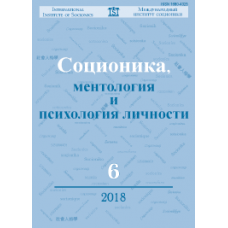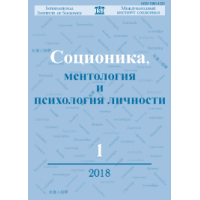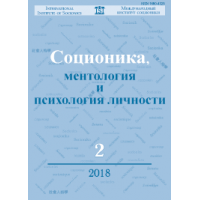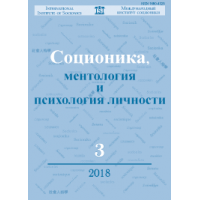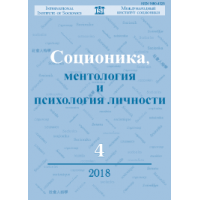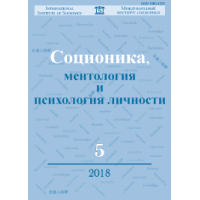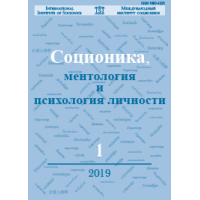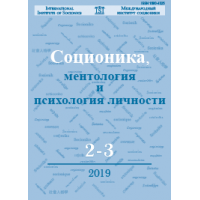Номер № 6/2018 журналу «Соціоніка, ментологія та психологія особистості»
Дослідження
Букалов А.В., Карпенко О.Б.
Еволюція людини: формування структури ФІМ та соціону
Проведено аналіз еволюційних особливостей формування психіки людини у процесі антропогенезу. Простежено особливості диференціації психічних функцій та психологічних, соціонічних типів особистості, включаючи формування їхньої цілісної системи, яка пов'язана інтертипними відносинами — соціону. Показано, що еволюційна диференціація біопсихічних модулів, виділених антропологом і лінгвістом Стівеном Пінкером, доповнених авторами, і зведених нами в єдину систему взаємодій між собою, призвела до виникнення в невеликих протолюдських групах 16-ти диференційованих типів психоінформаційної взаємодії. Ці типи спеціалізувалися на деяких виділених їх специфічною психічною структурою аспектах сприйняття та взаємодії з навколишнім світом, його властивостями, людьми, видобутком їжі тощо. буд. Одночасно в людини як соціальної істоти відбувалося формування системи інтертипних відносин чи психоінформаційних трансакцій. Це простежено на прикладах дуальних і конфліктних взаємодій виділених і описаних модулів. мірність психічної функції, інформаційна модель психіки, структура психоінформаційного простору, розвиток мозку, інтертипні відносини.
Коваленко Р.К., Звонарьова Н.А.
Ознака Рейніна «процес / результат» та «групи стресостійкості»
Розглянуто питання підвищення теоретичної валідності діагностичних інструментів ознаки Рейніна «процес / результат» та описи тетратомії «групи стресостійкості».
Ключові слова: соціоніка, ознаки Рейніна, модель А, моделювання, процес, результат, групи стресостійкості.
Практика типування< /h3> Храмченко Д.
Реперні точки типувальника за моделлю А, або «Смислові площини»
Популярно описана інформація, яка використовується для типування за методикою Школи системної соціоніки.
Ключові слова: соціоніка, діагностика ТИМу, типування, модель А, лексика, семантика, керуючі емоції, мотив, увага, переклад управління.
Інтертипні відносини
Ариничева О.В., Малішевський А.В.
Можлива соціонічна модель інтертипних відносин на базі теорій В.В. Гуленко та Г.А. Шульмана
Досліджено підхід до оцінки ефективності взаємодії з використанням теорії Г.А. Шульмана. Інтертипні відносини між випробуваними визначалися методом В.В. Гуленко. У статті аналізуються дані трьох експериментів із загальною кількістю учасників понад 400 осіб. Запропоновано нову таблицю інтертипних відносин на основі теорій Г.А. Шульмана та В.В. Гуленко. Запропоновано новий підхід до оцінки ефективності взаємодії в парі на базі даної таблиці.
Ключові слова: соціонічна модель інтертипних відносин, ефективність взаємодії. >
Мінаєв Ю.П., Рейнін Г.Р.
Математичне моделювання інтертипних відносин
Наведено результати узгодження позицій авторів статті щодо питань, що стосуються проблеми математичного моделювання інтертипних відносин. Хід обговорення цієї проблеми представлений у формі діалогу.
Ключові слова: соціоніка, класичні інтертипні відносини, «ознакові» інтертипні відносини, групи операторів інтертипних відносин, біполярні ознаки, групи центральних перерізів соціону, Аугустинавічюте Рейніна ознаки, Юнга Мінаєва ознаки.
Соціоніка 6/2018
- Модель: выпуск журнала «Соционика…»
-
$3.00
- Ціна в бонусних бали: 30
Рекомендовані товари
Соціоніка 1/2018
Номер № 1/2018 журналу «Соціоніка, ментологія та психологія особистості» Дослідження Ков..
$3.00
Соціоніка 2/2018
Номер № 2/2018 журналу «Соціоніка, ментологія та психологія особистості» Дослідження Кар..
$3.00
Соціоніка 3/2018
Номер № 3/2018 журналу «Соціоніка, ментологія та психологія особистості» Дослідження Про..
$3.00
Соціоніка 4/2018
Номер № 4/2018 журналу «Соціоніка, ментологія та психологія особистості» Методологія Лит..
$3.00
Соціоніка 5/2018
Номер № 5/2018 журналу «Соціоніка, ментологія та психологія особистості» Дослідження Ков..
$3.00
Соціоніка 1/2019
Номер № 1/2019 журналу «Соціоніка, ментологія та психологія особистості» Дослідження Таш..
$3.00
Соціоніка 2-3/2019
Номер № 2-3/2019 журналу «Соціоніка, ментологія та психологія особистості» Дослідження К..
$3.00

